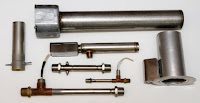 |
| Diagram of APCI highlighting heating element. |
For more information
on APCI heaters call BCE
at (510) 274-1990 or visit
Belilove.com/apci-heater
on APCI heaters call BCE
at (510) 274-1990 or visit
Belilove.com/apci-heater
Mass spectrometers work by removing target components as ions in a gas phase, and then detect them as ions under high vacuum. In the development of liquid chromatography – mass spectrometry (LC-MS) a significant problem arises from the vaporization from liquid mobile phase when large amounts of gas can be introduced into the mass spectrometer (MS), and thus decreasing the level of vacuum and impinging the ability of ions to reach the detector.
Dealing with the mobile phase and preventing the introduction of the smallest amounts of gas is critical in LC-MS.
Atmospheric-pressure Chemical Ionization (APCI)
One solution is to use Atmospheric-pressure Chemical Ionization, a specific type of chemical ionization. Atmospheric-pressure Chemical Ionization vaporizes solvent and sample molecules by spraying the sample solution into a heater (approx. 400 °C) using a carrier gas, such as Nitrogen. The solvent molecules become ionized via corona discharge and generate stable reaction ions in the mass spectrometer.
An APCI heater is a specialty electric heating element that has a resistance temperature detector (RTD) built-in for accurate temperature control, a .016” ID capillary tube in the center of the heater axis and a maximum operating temperature is up to 400°C. This assembly also comes complete with the connector plug.
For more information on APCI heaters contact BCE at (510) 274-1990 or visit http://www.belilove.com/apci-heater.
